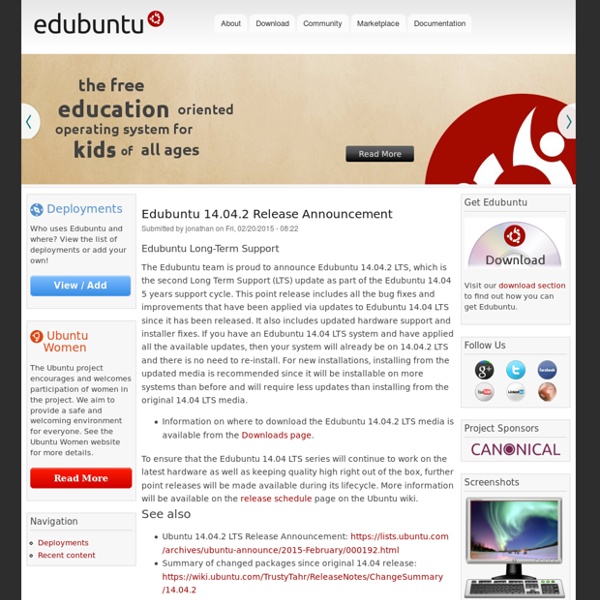



DoudouLinux - Français « DoudouLinux révèle aux enfants le potentiel créatif, éducatif, culturel et divertissant qui sommeille en tout ordinateur. » DoudouLinux est un système conçu pour les enfants afin de leur rendre l’utilisation de l’ordinateur la plus simple et la plus agréable possible (et pourquoi pas leurs parents aussi ! [1]), tout en se souciant de l’épanouissement des enfants. En plus de fournir des dizaines d’applications qui conviennent aux enfants de 2 ans à 12 ans, DoudouLinux cherche à leur présenter un environnement aussi facile à utiliser qu’une console de jeu. Ils peuvent ainsi facilement apprendre ou découvrir en s’amusant et… sans la surveillance permanente de Papa et Maman ! Mais DoudouLinux, c’est aussi facile pour Papa et Maman. Pour finir, l’objectif de DoudouLinux est aussi de rendre l’ordinateur accessible à tous les enfants de la planète, sans discrimination aucune, pour les inciter à réellement maîtriser la technologie – consultez notre manifeste. En savoir plus…
Doudoulinux, système d’exploitation libre et gratuit pour les enfants Doudoulinux est une distribution Linux (système d’exploitation libre) dérivée de Debian et destinée aux enfants de 2 ans à 12 ans. Disponible en 25 langues, Doudoulinux propose et c’est là sa force et sa particularité : plus de 50 programmes éducatifs : jeux, différentes activités d’expression dans le domaine de l’Art et de la créativité (dessin, musique, films d’animation…) et d’autres applications pour l’école (calculatrice, dictionnaire) ou encore des programmes pour découvrir l’ordinateur et aussi des applications ludiques. Interface sur un mode ludo-éducatif Distribué gratuitement sous licence GNU-GPL, Doudoulinux est un projet initié par le développeur Jean-Michel Philippe ; distribution qui propose un environnement agréable pour les enfants : une interface proche d’une console de jeu. Le plus : Doudoulinux se présente sous la forme d’un cédérom auto-exécutable : c’est-à-dire ne nécessitant aucune installation sur ordinateur. Module Internet respectueux de la vie privée Licence :